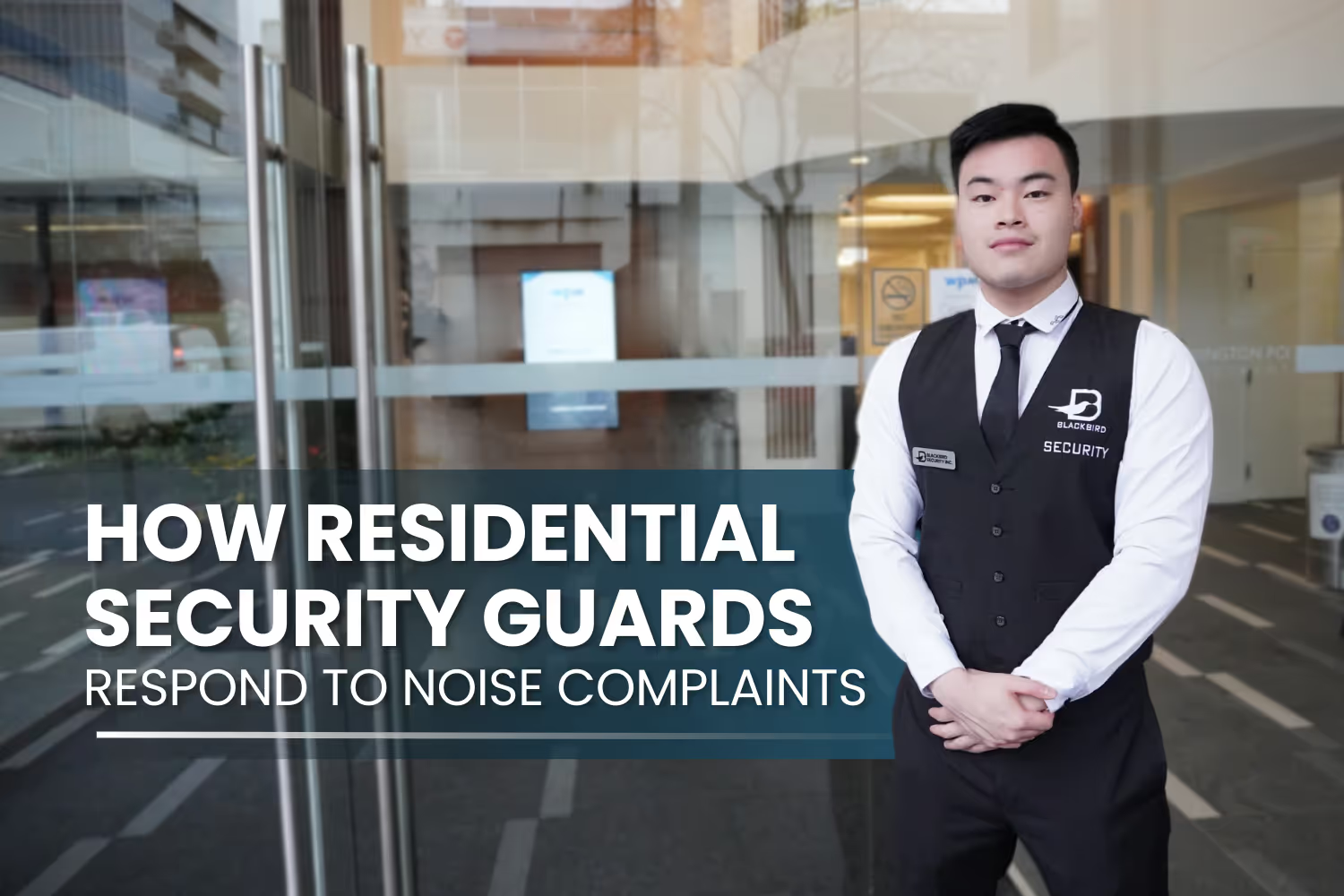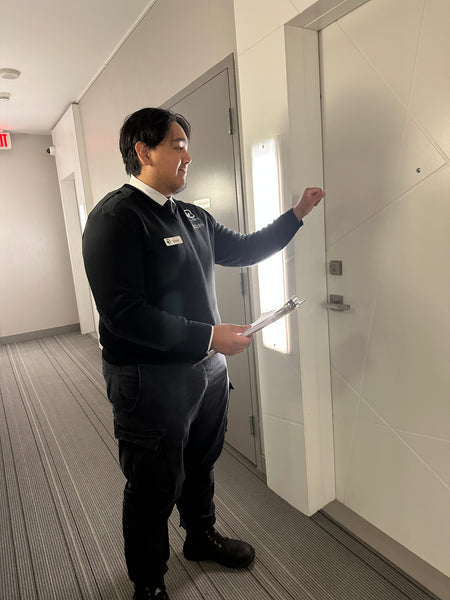Back
Back

Residential security guards are essential for maintaining a peaceful environment for building residents, and part of their role includes responding to noise complaints. Whether it’s loud music, a house party, or simply raised voices, residential security guards will calmly and respectfully resolve the situation.
For property managers, dealing with these complaints can be time-consuming and delicate, especially if disputes between residents arise. Having a professional residential security team on-site provides peace of mind with the knowledge that these incidents will be managed professionally. In this blog, we’ll discuss how security guards respond to noise complaints and ensure a respectful resolution that prioritizes the safety and satisfaction of all parties involved.

Noise complaints in residential settings can stem from a variety of sources. In most cities, quiet hours are designated between 11 pm to 7 am, resulting in most noise complaints occurring during overnight hours.
Disturbances such as ongoing house or car alarms, however, may be the subject of noise complaints during any time of day. In these cases, security guards will contact law enforcement to ensure the well-being of occupants, or to investigate potential burglaries.
Some of the most frequent causes of residential excessive noise complaints include:
When responding to excessive noise complaints, security guards follow a general protocol. Their goal is to de-escalate the situation, enforce building policies, and ensure all residents can enjoy a peaceful living environment. Here’s how they typically handle these complaints:
When a noise complaint is received, security guards prioritize responding quickly and professionally. They document the caller’s information, including the nature of the noise, the time it started, and the suspected unit. This documentation is important for reporting and may be used to evaluate ongoing issues in the future.
Once the call is logged, the security guard will investigate by locating the source of the excessive noise. They may conduct a walkthrough of the property, checking hallways and common areas to pinpoint the exact unit responsible. This step ensures that the complaint is accurate and prevents any misunderstanding between neighbours.

When the noisy unit is identified, the security guard will knock on the door and introduce themselves to the resident. They will calmly inform the tenant that a noise complaint has been received and ask them to lower the noise level. The guard will explain building policies and outline the potential consequences of continued noise disturbances, which may include contacting law enforcement, by-law officers, or building management depending on local regulations.
If the resident fails to comply and the excessive noise continues, the security guard will return to issue a second verbal warning. If the disturbance persists, the guard may contact the appropriate authorities, such as law enforcement or a by-law officer, and notify building management. Escalation is only used as a last resort, and guards aim to resolve issues through dialogue whenever possible.
Canadian cities have different fines outlined through by-laws for noise offences. In Vancouver, individuals may be subject to fines of at least $250 for excessive noise offences. Toronto outlines fines of at least $500 for noise offences. A residential security guard familiar with local by-laws can calmly relay consequences, including fines, to noisy tenants to help them understand the importance of compliance.
In some cases, noise complaints can lead to disputes between residents. Security guards play a critical role in mediating these disputes by ensuring both parties are heard and that the issue is resolved in a manner that respects everyone’s rights. The guard will listen to each resident’s perspective, explain building policies, and recommend solutions such as adjusting volume levels, using headphones or relocating loud activities.
Security guards can also serve as a neutral third party, preventing arguments from escalating into confrontations. By maintaining a calm and respectful demeanour, they help de-escalate tension and find a compromise for all involved. De-escalation training is paramount for mediating in situations such as these.
The key to peacefully resolving noise complaints and neighbourly disputes is respect and professionalism on the part of the residential security guard. They should make it clear that the request is not a personal judgment but a part of maintaining a respectful living environment for everyone. A security team trained in professionally interacting with residents during confrontations is an advantage that promotes a safe and peaceful environment.
At Blackbird Security, our residential security guards receive extensive training beyond the standard security training required to receive security guard certification. Our guards are trained in topics such as peaceful de-escalation, customer service, and crisis intervention, all of which is important when resolving residential disputes and complaints. In addition, our guards receive training in report writing and Canadian law, enabling them to provide a high level of service for our clients and their residents. Learn more about our in-house training program through Blackbird Academy.

Blackbird Security is proud to provide highly trained residential security guards who understand the unique challenges of maintaining a peaceful living environment. Our team is experienced in responding to noise complaints, mediating disputes, and ensuring a safe and welcoming atmosphere for residents.
Ready to partner with Canada’s leading residential security provider? Contact us today to learn more about our customizable residential security services and how we can support your property.
Explore our Definitive Guide to Condominium Security to learn more about the roles of condo security guards.



